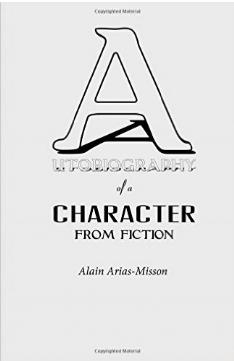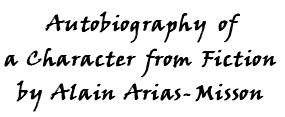There is a certain writerly compulsion to scrub away the mark of one's artistic influences. If dealt with too directly, the compulsion might threaten to paralyze the work before it's even produced. Call it a literary rite of passage that writers must at some point negotiate this fear. In an effort to affirm uniqueness, a writer can get stuck in stuttering clinamen - if it's been done before, it had better not be done again. A worse horror still if it's not done as well. If a work would be referential, it must yet avoid repetition. To surpass is the only option.
But why shouldn't an author instead embrace a vision of himself as the product of so many literary predecessors? Why should the mark of influence be an albatross? And, in fact, can those predecessors ever truly be killed, or is the writer stuck, like it or not, with the thumbprints of other writers all over their work? Is the only choice, inevitably, to perform as Borges' Pierre Menard and just write Don Quixote again?
Alain Arias-Misson's Autobiography of a Character from Fiction is an exploration of literature's ability to shape the way a reader understands the things she produces, both her art and her life. In fact, it is never just the art-making that becomes a product of its influences - it is the artist herself who becomes the product. There is a kind of misalignment of values, really, in bringing people to authorship through love of literature and then behaving as though literary influence should be tucked between the legs in puritanical shame.
In structure and concept, Arias-Misson's novel is bildungsroman. On a most superficial level, it is the story of Augustin whose refugee family leaves Belgium for the United States when he is a boy. As he grows up, he endures the perils of childhood and young adulthood in a tense home and at an isolating boarding school, agonizes through a first great love affair, and finally aspires for a life that is somehow something different, something mirrored by the novels he reads. And while the writing itself is full of compelling emotional depth, the artistic conceit that makes the novel so unique is in Arais-Misson's regular appropriation and repurposing of famous literary characters and important passages from literature, which he inserts directly into Augustin's life.
Though there are plenty of people in Augustin's life who are "real," the bigger portion of his relationships are literary - either they are characters borrowed directly from other texts, or they are real people with whom his relationships seem to be textual, precedented, or interpreted things, not least of all with his mother and with his great lover, Elena. Augustin's purely literary companions come and go as he ages, starting with childhood familiars like the Little Prince, Alice, and Dorothy, later joined by more mature protagonists like Stephen Dedalus and Marcel Proust (author-characters who not only lived in their books, but were also aesthetic practitioners of the appropriative and referential sort). In certain strange moments, characters overlap and engage with each other, producing a kind of new life in their new contexts: "The big innocent black man and the wise little white and blond girl were his best friends in bed, although they couldn't be more different! Augustin did sometimes wonder if Friday might be a little jealous of his intimate relations with sweet Alice, but then he was sure that was impossible - their roles were utterly different!" Characters often appear in these types of configurations: opposites in some way big or small, thrust together in weird, often psychologically telling encounters that position Augustin in the explorative space of the middle.
But these characters who are able move freely in Augustin's open, lived imaginative space never do take on their own agency. Sometimes they are living enactments of the events of their novels or the logical extensions of their novel-bound lives, and in these roles they sometimes take Augustin's place in central position, sometimes even becoming mixed in together with Augustin himself. Other times, they behave more like ego-complements to Augustin, sometimes standing in they object position for his narrativizing eye to move over, other times goading him into the choices he wants to make, other times providing him with a mirror by which to understand himself. Augustin watches Stephen leave with a prostitute, and when he finds a prostitute for himself, "[t]ears of joy and relief shone in his delighted eyes and his lips parted though they would not speak; it was verbatim his older and more experienced friend, Stephen's, experience." Verbatim not just a lifting of words here, but a supplanting of words into a new lived experience.
The novel is more literally appropriative in its way of dipping freely into borrowed prose, sometimes in exact form and sometimes in adaptation, and often in ways that alter or at least play around with the original meaning. This is most evident in the instances of borrowed speech. The Marquis de Sade provides voice to Augustin's younger sister after a traumatic childhood game of "doctor." At other times, there is simply no real distinction to be made between borrowed words and new ones. Ellenore of Adolphe gives voice to Augustin's lover, Elena, and though she calls him "Adolphe" in her directly appropriated words, the narrator says "she meant Augustin of course, but this changed none of the finality and the solemnity of the moment." But, then, what could be less romantic than having a lover use the wrong name?
And on a still more embedded level, literary concept and theory provide some of the more protracted through-lines that allow the novel to explore the relationship between text and experience in a more overarching kind of way. There is, for example, an almost relentless Freudian undercurrent at work that constantly turns Augustin back to his mother. Of course, she provides him with his formative sexual experiences, most notably in a moment`in which she seems, at least to Augustin's perspective, to knowingly and perhaps laughingly allow him to glimpse her through a peephole, and as the narrator sees straight from this moment into a far future, "the complicity of full awareness on the part of his partners would become dominant in his pleasures." Of course all Oedipal foreshadowings will eventually be realized. His great lover Elena is older, self-consciously motherly, the affair treated almost as a literary inevitability. "Love, it might be conjectured, alone could break down the barriers between life and fiction," the narrator says. Maybe, in truth, the connection is actually stronger there than anywhere else.
There is nothing new in life, the novel seems to hold, for it's all already been written, but this is no reason to despair. It's both a critique and a celebration, for it might be sort of dreadful to think of life one's life as predestined by the novels one reads, a kind of Flaubertian defeatism, and yet in the guidance, love, and manipulation that may all result from the experience of being a reader, to be able to find a self through literature seems absolutely worthy of comparison with the most intimate of lived relationships.
~
Rachel Greenberg is a writer from Baltimore, currently living in San Diego, CA. Her past fiction and reviews appear in Black Scat Review, Tethered By Letters, Thoroughfare Literary Review, and San Diego Writers' Ink.


